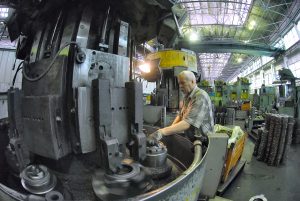 Last month, New Jersey’s Appellate Division reversed a trial court’s ruling that had dismissed an employee’s age and disability discrimination case.
Last month, New Jersey’s Appellate Division reversed a trial court’s ruling that had dismissed an employee’s age and disability discrimination case.
Spencer Robinson worked for Armadillo Automation, Inc., also known as Onyx Valve Co., in its assembly department. When Onyx hired Mr. Robinson, he was 60 years old. According to Mr. Robinson, when he was hired he made it clear he had a lower back condition and needed a stool so he could sit during the workday. Onyx provided him a stool.
Approximately six years later, Mr. Robinson experienced neck pain while he was working. He claims he reported his injury to the company’s vice president, who refused to send him the doctor and indicated he did not believe it was a workplace injury. Mr. Robinson further alleges the vice president told him he would not take him to the hospital unless he was “passed out on the floor or profusely bleeding.”
Mr. Robinson took a medical leave for approximately two weeks. Although his doctor released him to return to work, according to Mr. Robinson Onyx would not let him return to work without a release from his primary care physician. Mr. Robinson alleges that the company’s president insisted on speaking directly to his doctor even after he submitted a release.
Onyx claims that when Mr. Robinson returned to work he had difficulty performing his job and his productivity suffered. In contrast, Mr. Robinson claims his productivity was the same after he returned from his injury. He alleges the company began to complain about him using a stool and indicated it planned to take it away from him so he would have to stand. He further asserts that shortly after he returned to work, the company’s president and vice president asked him if he had reached retirement age and if he would consider working part-time or retiring.
The company subsequently denied Mr. Robinson a raise, purportedly because his job performance had declined and he had repeatedly violated a company’s policy requiring employees to clock out for lunch. The company eventually fired him for the same reasons and because he supposedly failed to obtain medical clearance before he returned to work.
Mr. Robinson filed a lawsuit asserting age discrimination and disability discrimination in violation of the New Jersey Law Against Discrimination (“LAD”) and retaliation in violation of the New Jersey Workers’ Compensation Act. The trial judge eventually granted the company’s motion for summary judgment and dismissed his case.
In Robinson v. Armadillo Automation, Inc., the Appellate Division reinstated Mr. Robinson’s lawsuit. It concluded there is evidence which, if believed by a jury, could support his discrimination and retaliation claims. This includes Mr. Robinson’s testimony that: his job performance and productivity did not change after his medical leave; he submitted an authorization from his doctor permitting him to return to work; he only failed to clock out for lunch once; and the company did not discipline other employees who repeatedly failed to clock.
Onyx argued that Mr. Robinson could not prove his age discrimination claim because the company hired him when he was 60 years old, and its president, who made the decision to fire Mr. Robinson, was in the same protected category. The Appellate Division rejected these arguments, explaining that although a jury could consider them it still might conclude that the company engaged in age discrimination.
With respect to Mr. Robinson’s disability discrimination claim, the Court found his testimony that the company’s vice-president refused to send him to a doctor, told him he did consider his injury to be work related, and would not take him to the hospital unless he was “passed out on the floor or profusely bleeding” further supported his claim. Likewise, the Court found sufficient evidence to support Mr. Robinson’s workers’ compensation claim, rejecting the company’s argument that it somehow could not have retaliated against him because it submitted his claim to its workers’ compensation insurance carrier.
 New Jersey Employment Lawyer Blog
New Jersey Employment Lawyer Blog

